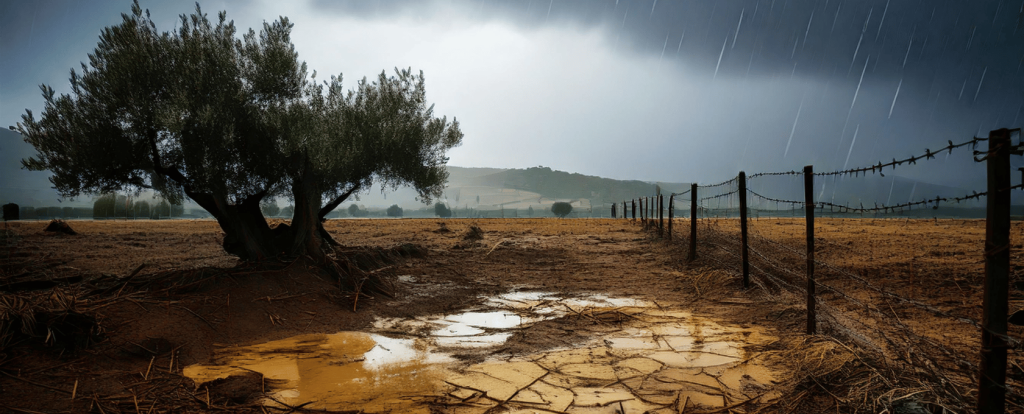TSIAKOURMAS AND OPERATIONS OF THE DEEP STATE…

It was a cold, rainy winter day.
The calendars showed 13 December 2000.
Panikos was travelling in his van towards the Pergamos crossing point.
This was his daily routine.
He would come close to the roadblock, pick up the Turkish Cypriot labourers working with him and take them to the relevant construction sites.
At that time, there were no crossings between the Turkish and Greek sides.
Our unemployed young people used to queue up in front of the ‘Military Recrutiment Office’, get a ‘special permit’ from the military authorities for a few days and go to the Greek Cypriot side to work.
Panikos, known as ‘Tsiakourmas’, was one of the few Greek contractors who employed Turkish labourers in his constructions.
At around 05.30 that morning, as he was travelling from Pyla to Pergamos, some people suddenly appeared in front of his vehicle and stopped him.
This was the territory of the sovereign British Bases and he could not understand who it was that had stopped him.
Those carrying out the ‘deep operation’ pulled him out of his vehicle and took him away.
He could not even switch off the ignition. It was raining and the wipers were working.
This meant that Tsiakourmas’ abductors were in a hurry.
His brother, who was following him in another work vehicle, also did not understand what had happened. He checked Tsiakourmas’ car. His bag and mobile phone were on the seat.
Hours passed and there were no news of Tsiakourmas.
After a while, the Turkish Police issued a statement.
Tsiakourmas was “caught and detained with 1.5 kilos of heroin.”
He was brought to court, arrested and imprisoned.
The allegation was this: “Tsiakourmas had left his car running, walked 500 metres through a muddy field, crossed a 4 metre wide ditch filled with water, climbed over a 1.5 metre high fence and was caught red-handed while dropping 1.5 kilos of heroin under an olive tree.”
No one had realised that this was a ‘deep state’ operation.
However, the operation was very ‘stupid’ and revealed the ‘intelligence’ of those who planned it.
The British High Commissioner did not intend to let this incident, which took place within its sovereign territory, slide.
They searched Tsiakourmas’ car thoroughly with specially trained dogs. There was no ‘clue’ that drugs were being transported in this vehicle.
They searched the field. There were no ‘footprints’ of Tsiakourmas walking 500 metres in the muddy field in rainy weather. On the contrary, his footprints ended just outside the vehicle.
It was impossible for him to cross a 4 metre wide stream filled with 1 metre of water and a 1.5 metre high fence.
There were plenty of ‘lies’ in the arguments presented.
The ‘deep state’ had botched the operation.
The British High Commission had prepared a report on the subject with documents and photographs.
In those days, the UBP-TKP coalition government, which was established at the beginning of 1999 and lasted 29 months, was in office.
Mustafa Akıncı was the ‘Deputy Prime Minister and Minister of Tourism’.
On the day Tsiakourmas was arrested, another serious development had taken place. The Turkish side had withdrawn from the five rounds of ‘indirect negotiations’ and stipulated the ‘recognition of the TRNC’ as a condition to sit at the table.
In other words, the same ‘separatist’ policy of today was put forth exactly 24 years ago.
Akıncı had sent a letter to the President of the Republic of Turkey, the Prime Minister and the Minister of Foreign Affairs, pointing out that this policy bore great dangers, and that it would “enable the Greek Cypriot side to become a unilateral member of the EU.”
Of course, no one even had the ‘courtesy’ to respond to this letter.
In those days, Turkish Foreign Minister İsmail Cem came to Cyprus and held a joint meeting with Prime Minister Derviş Eroğlu and Vice President Akıncı.
“I came to listen to you, what should we do?”, he asked…
Akıncı read the letter he had previously sent to the Turkish authorities, which he received no response in return, to İsmail Cem’s face, word by word.
Near the end, he said “First I am a human being, then a politician”, and explained the Tsiakourmas incident.
After a while, Tsiakourmas was released.
Before Tsiakourmas was ‘kidnapped’, a Turkish Cypriot was caught by the Greek Cypriot police in the same area with ‘drugs’ and sentenced to 10 years in prison.
After a while, he too was pardoned and released by the President of the Republic of Cyprus, Klerides.
In other words, the Turkish deep state had ‘retaliated’.
In those days, just like today, the ‘national cause’ consisted of an ‘impossible’ demand…
The Turkish side was saying, “the TRNC should be recognised and the two states should agree on a confederation.”
President Denktaş wanted neither Eroğlu, nor Ertuğruloğlu. He was saying, “They should resign.”
Tahsin Ertuğruloğlu, on the other hand, had said that, “Denktaş had descended on the country like a nightmare and had to go.”
Denktaş later told Akıncı, “Tahsin came and apologised. Apparently, he was drunk when he said that.”
Mustafa Akıncı’s book titled Yaşandığı Gibi [As It was Lived], Volume 3, covers the period 2001-2009.
All the warnings he made, and the concerns he pointed out, all of them came true.
The ‘impossible’ confederation theses of those years paved the way for the Greeks to join the EU on their own. Now, let’s see what trouble the separatist policies pursued by Tatar will cause.
There are many more experiences to be conveyed from these three ‘masterpieces’ by Akıncı. I am glad he wrote them, they have greatly updated our collective memory. Every Turkish Cypriot should definitely read these books.
This article was originally published on 31.12.2024